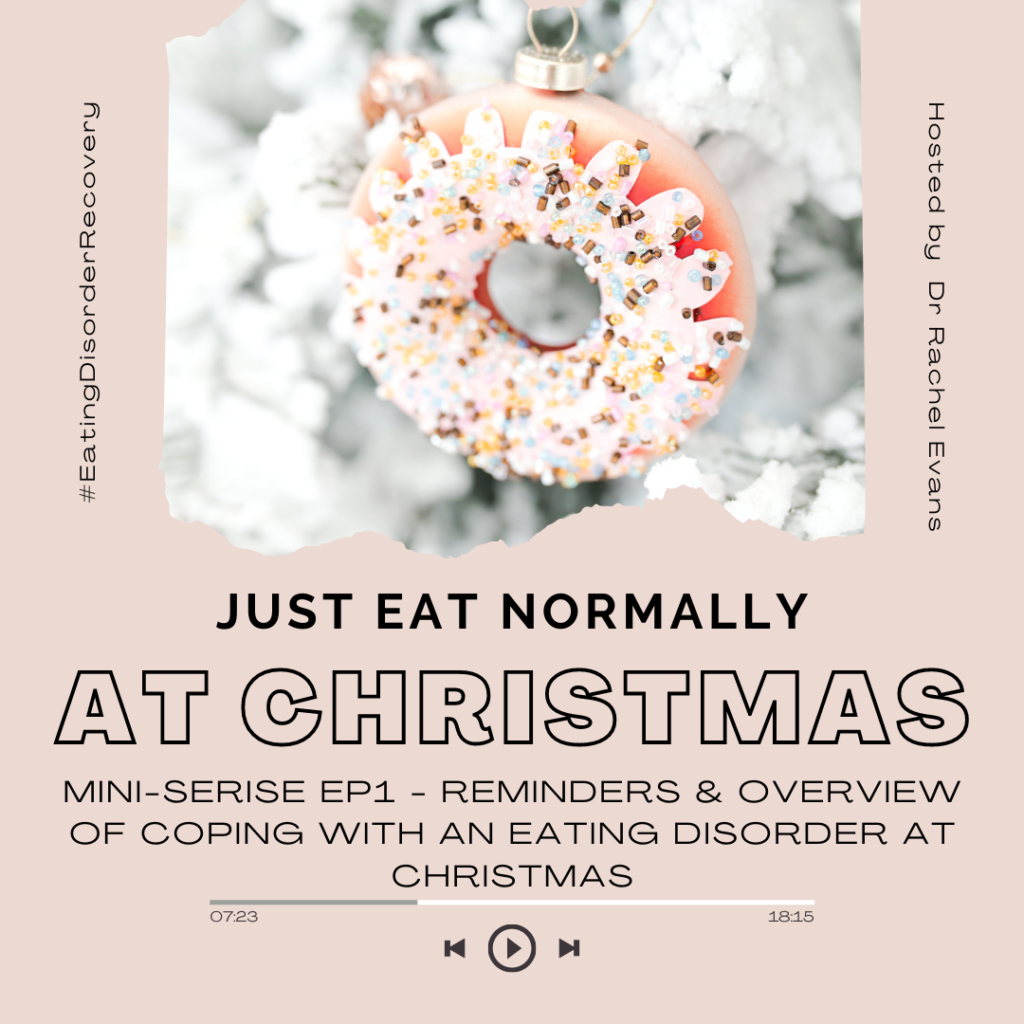Christmas time can seem overwhelming when you are in recovery or recovered from an eating disorder.
If you’re already starting to worry that “OMG it’s Christmas soon. All that food and the family meet-ups! I won’t be able to cope” then the ‘coping with an eating disorder at Christmas’ mini-series on the Just Eat Normally Podcast is for you.
In the first episode of the mini-series, Dr Rachel Evans helps you to put things into perspective and shares 3 actionable ways that you can manage and recovery from an eating disorder over Christmas time.
Please remember that this podcast shares opinions and information, it isn’t for the diagnosis or treatment of an eating disorder, mental or physical health issues.

Book a 1-1 Coping at Christmas ‘pick-my-brains’- session.
£100 off with the code XMAS2021
Listen to episode one on
or search “Just Eat Normally” on your podcast platformv
Read Eating Disorder Recovery at Christmas: reminders and overview
Here are some of the general principles to remember if you’re in active recovery from an eating disorder and worried about Christmas.
Keep things in perspective
Your eating disorder is probably making you feel anxious about Christmas well in advance! But remember, the Christmas period from 23rd December to 2nd January is only 10 days! That’s 2.7% of the year.
Next time you’re worrying about how you’ll cope, remember they are just days like any other days of the year and of those 10 days there is even less time when you’ll be less in control of food than usual (e.g., if someone else is cooking for you) or out of your routine.
Be realistic about if you are aiming to manage symptoms or make progress in recovery over Christmas
You’re unlikely to have an ideal Christmas and that’s ok. An eating disorder doesn’t just go away for the day because it’s Christmas!
For a lot of people, getting through the Christmas period and maintaining recovery, rather than being triggered into a relapse, is the most realistic goal. That’s not to say that you can’t have some great ‘wins’ and make progress. My client Bianca had her “first real truly happy Christmas with my family in the past 15 years…focused on love, on connecting with my family, on tasting and enjoying food :)” last year after working with me for 2 months before. Not every single eating disorder thought was gone, but she made a point of “sitting with any discomfort to truly break the cycle of making myself sick.”
The takeaway here is that I think it’s important to set your expectations and manage the expectations of others accordingly to avoid disappointment and be able to acknowledge and praise yourself for what you have done well.
Find your motivation and what’s important to YOU about Christmas
Get out a notebook and pen. Jot down what is important to YOU about Christmas. That could be spending time with loved ones, visiting a Christmas market or continuing a Christmas tradition of buying a beautiful bauble for yourself. Dig a bit deeper and ask yourself “what is important about these things?” E.g., it makes me feel connected and special.
Now write down what is important to the eating disorder over Christmas? Maybe eating the ‘right’ things, being in control or not gaining weight. Write down the behaviours that this is causing you to engage in, e.g., restricting, arguing with loved ones about food, avoiding certain social situations for fear that someone might comment on your weight.
Is what the eating disorder wants compatible with what you want and value about Christmas?
Usually not!!
(If yes, then I would suggest you seek 1-1 help for eating disorder recovery).
Understanding how the eating disorder is getting in the way of you having a Merry Christmas can help to motivate you to act in line with what is important to YOU and feel more motivated to engage in those behaviours that you know will lead you closer to recovering for good, and be in a much better place by the time next Christmas comes around.
Get ready to negotiate and compromise
Family often have different values and expectations to you about Christmas. Even for those who aren’t recovering from an eating disorder, Christmas often requires some compromises to be made and negotiations to be had so that everyone can have a happy Christmas.
I think that you can’t expect people to try and accommodate you if you’re not also willing to give a little. Perhaps your at a stage in your eating disorder where you really feel unable to go out of your comfort zone and make a compromise, which is ok, most people struggling have been there at some point. If this is you now then it might be best to clearly explain your needs to people, explain why you can’t be flexible at this time and seek 1-1 eating disorder recovery support.
If you are wondering how you can negotiate and come to a compromise then one technique you might like to try is thinking of your good, better, best scenarios then ask a loved one to think of their good, better and best case scenarios. See what similarities there are, what you could both compromise on but still meet your values, and then how it could be achieved.
Try a ‘coping sandwich’
That’s sandwiching the stressful event or situation between periods where you actively employ coping skills to calm yourself or reduce worries.
For example, if you’re feeling stressed about Christmas Dinner round the table with the family, then you would think about what activities you can do in the morning to reduce your nerves and put you in a better physiological state to cope later. Remember, these are positive things, such as distracting yourself watching a Christmas movie, playing with the kids or smelling an essential oil. NOT “if I restrict in the morning then I’ll feel better about eating later” – because you’re likely to find it hard to stop restricting later or end up binge eating as a result of getting over hungry).
Consider ahead of time what support you might need from yourself or others during the event/situation.
After the event use coping skills to self-regulate. If you don’t give yourself time to decompress and come back to a calmer state then you’re more likely to feel like the emotions or anxiety are building up, and turn to unhelpful coping mechanisms such as over-exercising, fasting, binge-eating, self-induced vomiting or self-harm to cope.
Other episodes of the ‘coping with an eating disorder at Christmas’ mini-series on the Just Eat Normally Podcast. COMING SOON.
Book a 1-1 Coping at Christmas ‘pick-my-brains’- session.
£100 off with the code XMAS2021

leave a comment
share
share
share
share
share